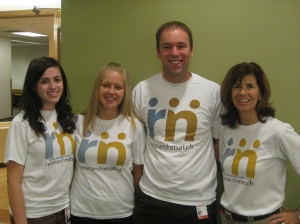In 25 days, three hours and eight minutes, I will be at the Duke Energy Center in Cincinnati, donation in hand and ready to “put my money where my mouth is.” But it’s not enough.

Learn how you can get started volunteering for research studies. | Click here
Every spring, my wife and I attend the annual gala for The Cure Starts Now Foundation (TCSN). It’s an annual event that has become a huge deal over the last seven years that aims to raise enough money to (according to their website) “find a homerun cure for cancer.” The event hosts about 1,000 people and in recent years has raised over $300,000 each year for pediatric brain cancer research. I’m proud to say that a very modest amount of those totals has come from me and my wife.
A wonderful cause, right? Absolutely. But it’s not enough.
One of the biggest barriers to the progress of clinical research, and ultimately better health care for all of us, is the lack of volunteers to participate in research studies. There are many promising (funded) research studies that never get completed because they couldn’t enroll enough participants.
Many promising research studies fail to enroll enough study participants. Data has shown that more than 81 percent of clinical trials are delayed due to participant recruitment that is inadequate to achieve statistically valid results.1 What is even more concerning is that only about 2 percent of the United States population gets involved with clinical research trials each year2 and somewhere between 15-20 percent of research sites never even enroll a single participant.3
There are a lot of reasons why people choose not to participate in research studies. Some of these reasons are based on common myths (see previous posts Myths 1 | Myths 2 | Myths 3) or misconceptions about participating in research studies, but often the entire concept of participating in a clinical research study isn’t even on the radar for people busy with everyday life. Sometimes it’s as simple as not being aware of opportunities for study participation.
For those unfortunate enough to have the blissful ignorance of living life without a second thought about their health ripped away by a life-altering diagnosis, it is inevitable that the thought of how clinical research has, or has not yet, led to advances in medicine that improve their health.
I was diagnosed with Type I Diabetes in December of 1992 at the age of 13. Back then, my doctors told me there was a lot of hope and optimism that a cure could be discovered within five to eight years. I still remain optimistic after 22 years that a cure will be discovered, however after having worked in a clinical research environment I have learned that the hold up isn’t always the science.
Like many others, not only am I relying on researchers to discover a potential cure for my disease, I am also relying on research study volunteers to help them prove that the cure is effective enough to be brought out of the lab and into practice. Only then will my doctor be allowed to prescribe it for me and help me regain that blissful ignorance that was taken from me all those years ago.
This is where you and I can make a difference. By all means, please continue to donate to great causes close to your heart like TCSN is to me and my wife, but don’t stop there. Make sure all that donated money doesn’t go to waste by volunteering for a clinical research study, even if it doesn’t have anything to do with your preferred cause.
Researchers frequently need “healthy” volunteers for their studies just as much as they need volunteers with a specific disease or condition so that they can ensure that their positive results can truly be attributed to the new treatments or therapies they are studying.
When the gala arrives next month, I will continue to donate money to TCSN (as well as a few other causes close to my heart), but I won’t stop there … I’m going to volunteer for another research study.
Learn more about the importance of participating in research studies and how you can get involved
1 Hess J. Accelerating clinical trials: Budgets, patient recruitment, and productivity. Cutting Edge Information.; Research Report. 2004 November 21; Available at: http://www.AcceleratedClinicalTrials.com.
2 Getz K. The Gift of Participation: A Guide to Making Informed Decisions About Volunteering for a Clinical Trial. Bar Harbor, ME: Jerian Publishing; 2007.
3 Pierre C. Recruitment and retention in clinical trials: What works, what doesn’t and why. Presented at: 2006 Drug Information Association Annual Summit; June 2006; Philadelphia, PA.
 |
Jeff Grever research communications specialistRead more posts from Jeff |






Leave a comment